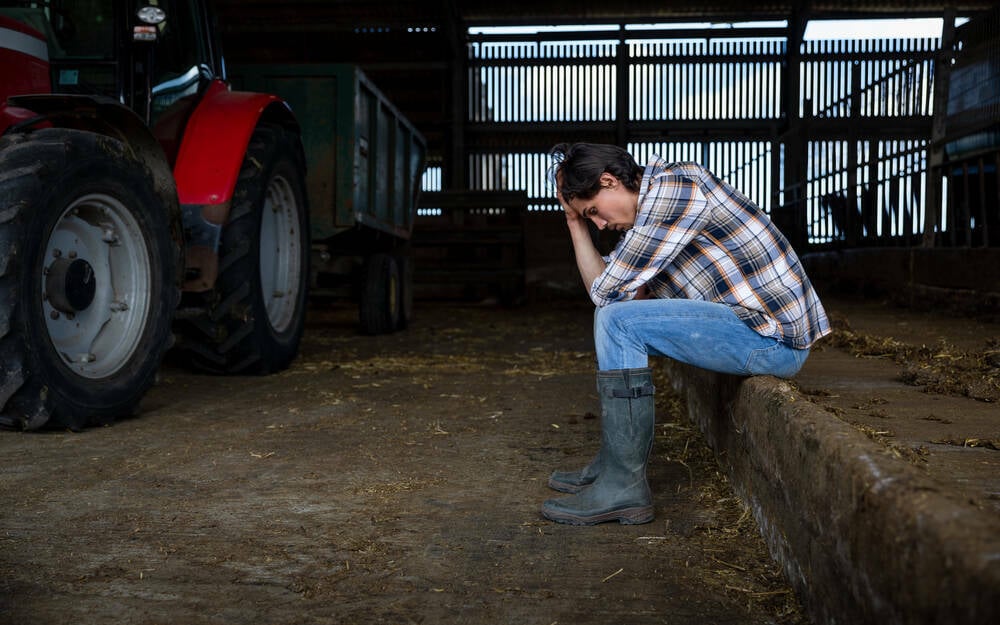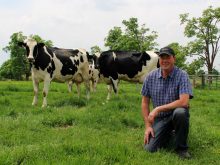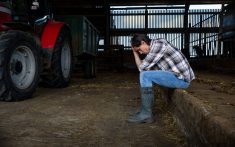It’s only been three years since a group of therapists — and farmers themselves — set their sights on ‘helping farmers thrive’ by forming the National Farmer Mental Health Alliance (NFMHA).
Why it matters: Farmers and rural communities can have unique mental health challenges.
Since then, they’ve been in high demand. Studies have shown that more than half of Canada’s farmers report they suffer from anxiety — that’s almost 10 times higher than Canada’s labour market. And 25 per cent of Canadian farmers reported experiencing suicidal thoughts in the past year alone.
Read Also

Melancthon faces a new quarry fight over water, environment and farmland risks
A proposed Strada blast quarry in Melancthon, Ont., sparks regional debate over water protection, farmland sustainability, and Ontario’s aggregate policy.
“Not only have we seen an increase in farmers accessing our services lately, but we’re also seeing more men reach out for support since we began, which is especially encouraging,” says Lauren Van Ewyk, M.Sc. MHC, RSW. She is an Ontario sheep farmer, as well as co-founder and CEO of NFMHA.
“There’s been notable progress made around the willingness to talk to a professional, but farmers continue to experience chronic stress, especially with increasing challenges like rising input costs, mounting debt, decreased commodity prices and unstable markets. For some, their resilience skills are on the brink of exhaustion.”
Making resources accessible
The ongoing and rising need for farmer mental health services is one of the driving forces behind the expansion of NFMHA services. They launched their podcast, the Rural Well, last September as a way to bring hard topics to farmers in an accessible, free and unintimidating way. The new podcast is a partnership between NFMHA and Bridgette Readel of Lilac Lane Media in North Dakota.
Since its release, the podcast has posted 16 episodes. “We believe that farmers, when given tools to support their wellness, have the skills and resilience to thrive — so that’s our goal of this podcast,” says Van Ewyk. “Through the podcast, we’re able to talk about hard topics like grief, addiction, suicide and depression. We want farmers to know that they are not alone, and our world is better because they are in it — even when its rough.”
Another major focus for NFMHA has been building connections within the agriculture community and launching the development and accreditation of the 12 module Agriculture Informed Therapy (AIT) online training courses. Van Ewyk explains that AIT provides mental health workers with the opportunity to understand the barriers to care, pressures and challenges, family dynamics and expectations and how to tailor therapeutic interviews for rural and farm clients.
The program introduces therapists and students to the unique needs and treatment strategies for farmers, their families, and their communities. It is also nationally recognized and provides continuing education credits to professionals.
So far, 95 therapists have taken the training and have provided incredible feedback to the NFMHA team, says Van Ewyk. The province of Nova Scotia has even supported the training and have developed conferences and educational events around the program for therapists.
“The uptake of AIT has created a community of practice for some therapists that are also located in isolated areas and rural communities. It is streamlining the process to make services more accessible for farmers, so they can speak directly with professionals who are combining their training in the mental health industry with their lived agricultural experience,” says Carrie Pollard, NFMHA co-founder, MSW, RSW and grain farmer, who notes they are also seeing an increasing number of therapists participating in the AIT training from the U.S. and the United Kingdom.
Last year, the NFMHA partnered with Three Oaks Respite Cabin to support farmers and first responders who utilize the cabin’s services. This collaboration continues to open opportunities for the NFMHA team to offer ongoing counselling support following a guest’s stay at the cabin.
Supporting farmers’ wellness
As more awareness about farmer and rural mental health continues, the hope is that more farmers, their families and those involved in the industry will reach out to utilize services to support themselves and those around them.
“The stigma around mental health is still very much a part of the culture of rural communities,” says Pollard, noting that there appears to be less stigma among younger generations of farmers, who are also more aware of the mental health challenges faced by those working in agriculture.
“This is one of the reasons why telling our stories to others and continuing to have conversations in a helpful manner is so important.”
To meet the ever-growing need of farmers and rural communities and make mental health services more accessible, NFMHA has been expanding their team. They’ve brought on several new speakers and training facilitators, including Dr. Leith Deacon, associate professor and McCall MacBain, chair of Resilient Rural Communities.
Dr. Deacon has come on board as the director of research for NFMHA and recently published a study in 2023 that provided some excellent insight into the impact of COVID-19 on rural community members.
“Dr. Deacon’s study found that rural women experienced the greatest decline in wellness than any other group and highlighted that rural and remote Canadians continue to face barriers to accessing helpful rural wellness services,” says Van Ewyk, noting that this research highlights the importance of improving access to mental health services in rural areas.
“There is still so much to be done,” notes Van Ewyk, who has her sights set on expanding NFMHA to train therapists and support farmers and rural communities both in Canada and the U.S. and eventually on an international level.
For now, she welcomes farmers and therapists who are interested in learning more about the NFMHA services to visit www.nfmha.ca or visit the NFMHA team at Canada’s Outdoor Farm Show on September 9 to 11, 2025.
“Our goal is and always will be to help farmers thrive, that’s why we strive to make mental health support services easier, more effective and more accessible for everyone who needs them,” she says.














